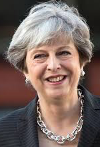|
Brexit Redux: Parliament Nixes 8 Different Plans
March 27, 2019
The United Kingdom is no closer to securing any kind of legislation surrounding Brexit, after Parliament rejected eight single alternatives to a plan already rejected twice–one championed by Prime Minister Theresa May and hammered out with the approval of the European Union. Parliament declared its intention to go its own way in debating and then voting on the eight measures. One of those was a repeat of a decision taken just a week earlier: no leaving the EU without a deal at all. The plan that came closest to succeeding was one that would see the U.K. leaving the EU but remain in a permanent customs union arrangement with the EU, guaranteeing free trade of goods between the U.K. and EU member nations. The key word in the proposal was "permanent," which is why ultimately a slight majority of lawmakers rejected it. A call for a second referendum was voted only slightly less decidedly, losing by 27 votes. The idea of another nationwide vote to, in effect, reconsider the question put to the nation in 2016 has gained proponents in recent weeks, as the clock ticked down to deadline day. On March 29, at 11 p.m. GMT, the U.K. will leave the EU, deal or no deal, under the terms of Article 50 of EU Constitution, which May invoked two years ago in the wake of the referendum, the results of which showed that 51.9 percent of those who voted wanted the U.K. to leave the EU. May recently sought and won an extension to that deadline. The EU agreed to an extension of April 12 if no deal is reached and May 22 if Parliament does approve a deal. May has sought to have Parliament vote on her deal a third time, even offering to resign as Prime Minister if the deal passes. Some lawmakers are supporting the idea of a third vote. Speaker of House John Bercrow, however, has ruled that the deal must be substantively different in order to be considered. Even if May wins the right to a third vote, passage still seems unlikely, observers said, perhaps even moreso because the Democratic Unionist Party, in coalition with the Conservatives in Government, still opposes any agreement that would incorporate the so-called "backstop," the idea that Northern Ireland would be kept in a customs union with the EU even after the U.K. leaves. May has steadfastly refused the idea of staying in such an arrangement. Lawmakers planned to be back for another day of debating–and, perhaps, more voting–tomorrow. |
|
Social Studies for Kids
copyright 2002–2024
David White






